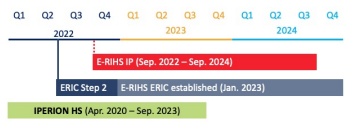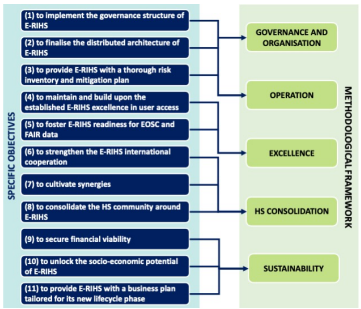The European Research Infrastructure for Heritage Science (E-RIHS) was designed as a pan-European distributed infrastructure with the vision of replacing the traditional science-for-art approach to conservation through the new widely interdisciplinary sector of Heritage Science (HS) to improve the understanding and sustainable preservation of cultural heritage.

E-RIHS was announced in the 2016 ESFRI Roadmap and is now preparing its step 2 application to take the legal form of an ERIC. The E-RIHS Implementation Phase (E-RIHS IP) consortium brings together representatives of the national nodes of the countries that expressed their willingness to support the establishment of the ERIC and one permanent observer. It aims at enabling the E-RIHS implementation phase and preparing the operation of E-RIHS ERIC, also in support of its positioning as the reference RI for the HS domain at the EU and global level.

The main objective of the European Research Infrastructure for Heritage Science Implementation Phase (E-RIHS IP) project is to enable E-RIHS ERIC (E-RIHS) to start its operation phase and position itself as a reference for excellent research for the wide interdisciplinary community of heritage science.
The projects goals are:
- Implement the E-RIHS governance structure and finalise its distributed architecture.
- Support the E-RIHS management with strategies and related implementation plans regarding HR, procurement, risk management and quality system.
- Maintain and build upon the established E-RIHS excellence in user access and foster FAIR open access with the design of the DIGILAB platform.
- Strengthen international cooperation, cultivate synergies and consolidate the HS community around E-RIHS, while establishing E-RIHS in the landscape of EU RIs and global initiatives.
- Secure the ERIC sustainability and unlock its socioeconomic impact potential by providing E-RIHS with an updated business plan and a marketing strategy tailored for its new lifecycle phase.
Planned research:
- Ensure adequate management and coordination among WPs and proactive interaction with the EC, the E-RIHS iCNN and iGA for decisions concerning the implementation phase of the future ERIC.
- Delve into legal issues to finalize the distributed architecture of the RI (establishing the National Nodes, setting up the Central Hub, in-kind contributions, cooperation agreements between the National Nodes and the ERIC and updating the Rules of Procedures).
- Prepare staffing plans and procurement procedures to kick-off the operational phase of the ERIC as well as its risk management and quality assurance plans
- Deal with the sustainability strategy of the new lifecycle phase of E-RIHS by revising the Business Plan to reflect the new needs and challenges, promote activities for E-RIHS enlargement and its inclusion in RI National Roadmaps and strengthen the specific skills of RI access service providers and managers.
- Ensure the operativity of the integrated access services of ARCHLAB, FIXLAB and MOLAB at the starts of the ERIC and their attractiveness. Also to finalise the conceptual plan of the e-access platform DIGILAB, and tests its pilot.
- Exploit the outcomes of the project’s results, implement activities for reinforcing the cooperation of E-RIHS with relevant initiatives at EU and global level and develop communication and dissemination strategies for the future ERIC.
Partnership
The project is funded through the Horizon Europe Framework Programme and involves 19 partners, among which are:
- CNR – The National Research Council, Italy (Vania Virgili)
- KIK-IRPA – Royal Institute for Cultural Heritage, Belgium (Hilde De Clercq)
- FSP – Foundation for Cultural Heritage Sciences, France (Remi Petitcol)
- FORTH – Foundation for Research and Technology – Hellas, Greece (Demetrios Anglos)
- ATOMKI – Institute for Nuclear Research, Hungary (Zita Szikszai)
- UL – Heritage Science Laboratory Ljubljana at UL Faculty of Chemistry and Chemical Technology (Matija Strlič)
Please contact us for further information or to establish collaboration.
